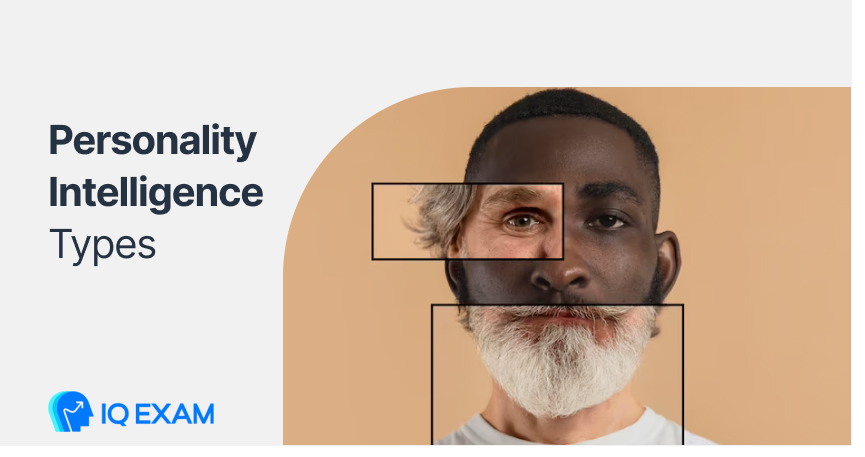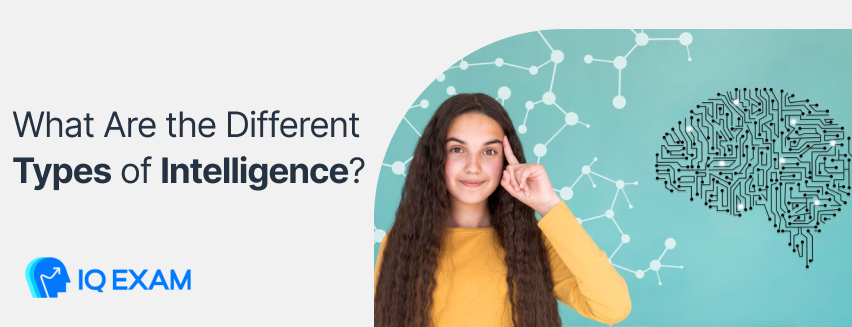
There are many definitions of Intelligence; it can refer to the highest abilities of a person, such as problem-solving, reasoning, mental capabilities, and decision-making. Or it can refer to learning abilities, emotional knowledge, adaptation, and creativity. In general, Intelligence can define a person’s ability to understand and gather information and apply them to personal behaviors in an environment or situation.
Some types of Intelligence are more known and appreciated, but the truth is that no type of Intelligence is superior to another. It is the same when we say that a person with a high IQ score is not necessarily more talented than an average IQ score. The most important thing is to understand what type of Intelligence you have.
This understanding can help you increase your built-in strengths and concentrate more on the fields you need to improve to succeed. In this article, we will learn more about different intelligence types and how they can shape a person’s personality. Read more to find out what type of personality intelligence you have!
Definition Of An Intelligence Type
Intelligence type can represent the level of your strengths and the field in which you can shine the most. Each intelligence type will represent the skills that you possess. The types of Intelligence can vary based on different theories that are out there. For example, one theory suggests that only one type of Intelligence exists.
Another theory believes that more than eight types of Intelligence can cover different fields, such as problem-solving, cognitive, social skills, or even a person’s body movement level.
Based on Gardner’s theory, there are different types of Intelligence, such as linguistic, logical-mathematical, spatial, musical, bodily-kinesthetic, interpersonal, intrapersonal, and naturalistic Intelligence.
Each intelligence type indicates a specific set of skills and capabilities that an individual might possess. By understanding and identifying each of these intelligence types, people can acknowledge their different strengths and talents and appreciate them more.
Different individuals have different skills; some might have athletic talents, while others can be better at teamwork. Some people can learn a new language easier as a child, and others are fast learners regarding numbers and calculations. But, most people are not aware of their abilities, so they choose the wrong careers in their life path. In other cases, people might enjoy their job but can’t recognize the learning methods to help them progress.
What Is The Meaning Of Personality Type

There are still a lot of debates about whether different personality types exist or not. You might wonder why this should be controversial; here is why. A personality type is a psychological category of different individual types. Still, a personality trait indicates an individual’s different forms of feelings, thoughts, and behaviors, which will make a person different from another.
Personality results from genetics and environment, which will stay almost steady throughout life. Usually, we describe people’s traits based on their personality; for example, we say: “He is so kind, thoughtful, and a bit optimistic,” or we might say, “They are loyal, but sometimes they can be protective of their family.”
As a result, there are multiple definitions of personality. Still, most of these definitions focus on the pattern of characteristics and behaviors which can help us to predict or describe an individual’s behavior.
What Are The Main Personality Types?

Many modern psychologists suggest five main personality types, usually the “Big 5” personality types. These “Big 5” personality types include agreeableness, Openness, extraversion, conscientiousness, and neuroticism.
Researchers have conducted so much research to develop these personality traits, and they are considered tools for analyzing and evaluating a person’s behavior. For example, psychologist Gordon Allport found more than 4000 personality traits, and even when they brought it down to 16 types, it still seemed complicated. This era was where the “Big 5” personality types emerged.
Even though there has been comprehensive research about each type, some researchers still need to agree on the definition of each personality type. With that being said, these five personality types are usually defined as:
Openness
This personality type (Openness to new experiences) focuses more on an individual’s imagination and insights. People who gain high scores in Openness have a vast range of different interests. They are curious about the universe and other individuals, ambitious to learn new things, and enjoy new experiences. Openness evaluates how much a person is creative or imaginative, so people with an openness personality type are the opposite of people who tries to do every reasonably and rationally.
Conscientiousness
This personality type refers to individuals who are thoughtful, attentive, motivated and have goal-oriented behaviors. These traits are usually seen among people who work in fields such as science or even finance, where attention to detail and organized work style are needed essential skills. Conscientiousness evaluates how much an individual is organized, careful, purposeful, and disciplined.
Extraversion
This personality type indicates how an individual can communicate socially. Extraversion explains your emotional expressions and how comfortable you feel in an environment. Extraversion evaluates how much a person is social, energetic, and outgoing. People who gain low scores on the extraversion trait are more introverted, quiet, or even more independent.
Agreeableness
This personality trait describes how eager an individual is to communicate with others. Agreeableness is more insists on people’s interactions with each other. Agreeableness evaluates an individual’s willingness to engage in social interactions. This personality type defines how well a person can get along with others and how they will do in teamwork.
Neuroticism
This personality trait refers to emotional instability, unhappiness, and moodiness. People who gain high scores in neuroticism have high anxiety, sadness, and mood changes. People who gain low scores in this personality trait are usually more emotionally stable.
What Are the Different Types of Intelligence?

Understanding different intelligence types can help people to gain better learning results. Identifying your intelligence type can help you learn and practice more in the fields you need to improve. Intelligence has always been a popular topic among scientists and psychologists for centuries.
In the past 30 years, much research has indicated that you need more than scoring well on a test to prove you are a smart person. Dr. Howard Gardner, a neuroscience professor at Harvard University, was the first person who discussed the multiple intelligence theory in 1983.
His theory disagreed that a standard test including questions with short answers could calculate Intelligence. Instead, he believes that there can be multiple types of Intelligence, and each individual has a unique combination of these intelligence types.
Some of the most known intelligence types are as below:
Musical Intelligence
People with high skills in learning music have a powerful sense of different musical notes and sounds. These people are very talented in understanding and identifying rhythms and tones. People with musical Intelligence can convert irrelevant concepts into musical arrangements or rhythmic styles. They can learn musical instruments quickly and listen to music while studying without distraction.
Naturalistic
People with naturalistic Intelligence appreciate the natural world profoundly and are always fascinated by different life shapes. They have high skills in recognizing and identifying different plants, species, and other components of the natural universe. The best way they can learn is to experience everything personally, make observations, and express their feeling about nature.
Interpersonal
Individuals with Interpersonal Intelligence usually understand verbal and non-verbal signs well. They also have high skills in identifying different moods and tempers. They are empathic people; these characteristics are usually found in leaders, social workers, politicians, life coaches, and psychologists.
Existential
This intelligence type refers to people with a high level of sensitivity and individuals who are always curious about the meaning of existence and can answer complicated questions about life philosophy. Based on Gardner’s research, the Existential intelligence type is one of the most complicated types of Intelligence.
Spatial
This intelligence type is found in people who can think in three dimensions. Their main capabilities involve spatial reasoning, mental imagination, image manipulation, and artistic skills.
Logical-mathematical Intelligence
Individuals with this intelligence type are geniuses in reasoning and logic. They have a gift for identifying the detailed patterns between multiple symbols and then using these patterns to create intellectual thoughts. They are masters at thinking based on maps, thoughts, formulas, and equations.
Linguistic Intelligence
This type of Intelligence includes a human’s ability to have thoughts in words and then use these words to make other individuals understand them. People with linguistic Intelligence have high skills in turning their thoughts and feelings into words so others can understand them. They are interested in different activities such as writing, reading, and speaking in public.
Intra-Personal
This intelligence type is about self-awareness and people’s capability to understand themselves. For instance, this Intelligence can be identified among people who understand what they are feeling and why they are feeling it. Intra-Personal Intelligence also refers to acknowledging and admiring the human condition, which means behaving with others in a way you would like others to treat you.
Bodily Intelligence
This intelligence type is an individual’s ability to use multiple physical skills. Body intelligence includes a collection of magnificence skills requiring mind and body coordination. Dancers, surgeons, and athletes possess high levels of Bodily intelligence type.
Conclusion
When we talk about different intelligence types, we should also point out that many people possess different types of Intelligence, not just one. Moreover, your personality type may be more interested in one intelligent type than another, and there might be an intelligent type that gets your attention more than others.
Personality intelligence types offer essential and valuable information about how people understand and process different data, make vital decisions, and communicate with their world and environment. By understanding these different intelligence types, we can gain a deep perception of ourselves and others and try to create more constructive communication with others.
It is crucial to remember that none of the personality intelligence types is better than others or more valuable than others. Each of these types can bring their strengths and point of view for an individual.
Understanding and respecting these differences can help individuals have more balanced and pleasant relationships, improve their problem-solving skills, and increase their empathy.
All in all, personality intelligence types provide instruction for self-awareness and personal growth, helping people to handle their complicated relationships with more understanding and sympathy.
